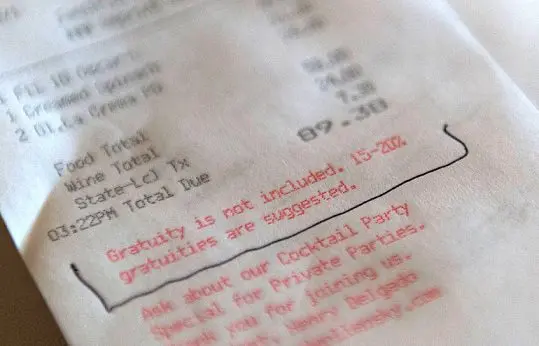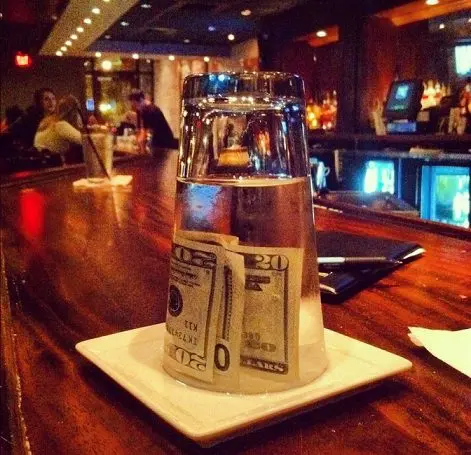Tipping is a monetary reward voluntarily left by a client for employees of restaurants, cafes, hotels as a thank you for good service. In each country, the traditions of handing and the amount of tips are different. In order not to get into a piquant situation, it is useful for every traveler to know these features.
Tips:
- tipping is not obligatory, but desirable, often for service personnel (waiters, maids, porters) this remuneration is the main source of income;
- before leaving money in a restaurant or cafe, check the receipt, perhaps the tip is already included in the price;
- if tips are passed from hand to hand, it is advisable to supplement them with a smile and verbal gratitude for the service;
- you can not leave a tip to officials and policemen, this is considered a bribe.
How much to tip
Russia · Ukraine · Belarus. The amount of remuneration depends on the level of the institution. The common practice is 10-15% of the invoice amount. In cheap cafes, tips are left less, for example, they round the bill up and do not require change from the waiter. If visitors themselves receive an order at the checkout, you can not give a tip at all or leave a trifle on a plate from under the coffee.
USA and Canada. In these countries, tips start at 15% and are given to everyone: waiters, bartenders, maids, taxi drivers. The higher the service, the more the employee expects to receive. In expensive restaurants, it is customary to leave up to 25%. In the United States, the size of a tip is considered an indicator of the quality of service. If the client left little tip or did not give them at all, the administrator of the establishment has the right to ask what caused his dissatisfaction.
United Kingdom. If tips are not included in the cost of service (often Russian tourists write them on the check), you need to leave 10-15% of the order amount. It is not customary to tip English bartenders, but you can treat them to a glass of beer or other drink.

France. Here, the tip is called “pourboir” and is immediately included in the cost of service, usually 15% for dinner at a selected restaurant. But no one bothers the client to leave an additional change on the plate for the bill. Taxi drivers are given 5-10% of the cost of the trip, maids in hotels – 1-2 euros for cleaning.
Switzerland, Netherlands, Austria. Tourists leave 3-10% tips only in reputable expensive establishments, too large amounts are considered inappropriate and a sign of bad taste.
Sweden, Finland, Norway, Denmark. In the Scandinavian countries, payment is strictly by check, it is not customary to give a tip, the attendants do not wait for them. Satisfied with the service, the client can personally transfer a small amount to the maid or taxi driver.
Bulgaria and Turkey. Tips are called “baksheesh”, they are included in the cost of service, but the waiters are also waiting for an additional reward. The client has to pay twice. You can leave 1-2 dollars in cash, this will be enough. In Turkish taxis there are special boxes for collecting tips.

Greece. In restaurants, it is customary to leave 10% “fidorima” (tips), for porters and maids – 1-2 euros, for taxi drivers the order is rounded up. Money is not passed from hand to hand, it is better to leave it on the table.
Italy. Tipping is called “caperto” and is included in the cost of service, usually 5-10%. A few euros can be left personally to the waiter at the table.
Germany and the Czech Republic. Tips are included in the cost of service, but the staff expects to receive a small reward from the client. Usually it is invested in an account, since it is not customary to openly give money.
Spain and Portugal. Tipping is not included in the price, so it is better for tourists to use the standard scheme: 10-15% of the bill in a cafe, a couple of euros for maids and porters, taxi drivers round the bill up. Everyone will be happy.

India and Thailand. Service by check. Tips are not considered obligatory, the staff does not expect them, but they will not refuse a few dollars of reward either. Usually after that the level of service rises.
Egypt. The staff does not receive a salary, working only for remuneration from tourists, tips in Egypt are required, 10% of the bill is enough in any situation.

Israel. It is customary to tip for any service, even for service at a hairdresser, the size is 10-15%.
United Arab Emirates. The maids are forbidden to touch the money of the client in the room, so they are given a tip in person (as well as porters 1-2 dollars). The fare is negotiated with the taxi driver at the beginning, they do not expect additional remuneration. In a restaurant, 10% is the best option.
Australia and New Zealand. In these countries, tipping is not accepted, but rounding the bill in the direction of the employee is welcomed and accepted with gratitude.
Japan. Customer service at the highest level, the Japanese consider it their duty, an additional reward may offend the owner. This is one of the few countries where tips are not accepted at all. A foreigner who accidentally left money in an institution is returned everything.
China. Officially, tipping is prohibited; this is strictly monitored in provincial cities. But in expensive restaurants it is customary to leave 4-5%. In all other cases, 1-2$ for the service rendered is enough. From the first time, the employee will refuse the money, he will take it only after the second request, without showing joy on his face.









